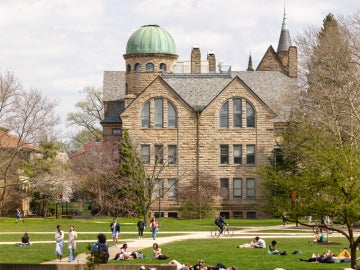Tamika Nunley Explores History of African American Women in Early 19th-Century Washington, D.C.
Her latest book examines the experiences of women who navigated challenging situations to imagine a life for themselves.
March 12, 2021
Amanda Nagy

Associate Professor of History Tamika Nunley.
Photo credit: Jennifer Manna
Associate Professor of History Tamika Nunley tells a story of self-determination and reimagined identities in her new book, At the Threshold of Liberty: Women, Slavery, and Self-making in Washington, D.C. (UNCPress).
The latest work by Tamika Nunley takes readers to Washington, D.C., in the early 19th century, where from the founding of the nation’s capital to the American Civil War, a history emerges of African American women—enslaved, refugee, and free—who developed their own ideas about liberty. Through a collection of stories weaved from research into letters and diaries of prominent Washington, D.C. figures, court records, and government documents, Nunley uncovers the rich history and experiences of women who navigated challenging situations to imagine a life for themselves.
A historian of early American history, slavery, and the Civil War, Nunley has always been deeply interested in the history of African American women. In this book, Nunley shows how African American women occupied different legal categories. Whether women became fugitive or free or a refugee isn’t as promising as it might seem to contemporary interpretations of freedom.
“They still faced a limited set of options in terms of the kind of income they could earn and the degree to which they could be independent and included,” Nunley says. “As citizens of this nation, all the things we associate with freedom were incredibly circumscribed for Black women after the Civil War was over.”
Nunley takes a humanistic approach and imagines how African American women saw themselves beyond their legal categories.
“It's a very complex project because it's difficult to know how one imagines oneself even today, being able to interview someone in person. But in this sense, I interpret their public actions—as much as I have access to—to contemplate and consider what they may have been thinking about.”
Nunley is among a small group of scholars doing work on the African American experience in Washington, D.C., in the early 19th century.
“It’s fascinating to me because D.C. history is not as expansive compared with Virginia or other American city counterparts, but it has a robust African American middle class that has its roots in the early 19th century. The making and design of the city represents so much about the nation’s aspirations for itself. As D.C. becomes a national symbol, both socially and architecturally, I wondered where the African Americans were in all of this.”
Consequently, the city was full of contradictions, with enslaved people serving the legislators and politicians who were putting forth definitions of liberty and egalitarianism.
“This is a point that we haven’t fully grappled with, and I hope books like mine are a starting point, and that we continue to build on that conversation.”
In addition to a recent virtual book talk hosted by Mount Vernon, Nunley gave an in-depth interview with Smithsonian Magazine.
You may also like…
Oberlin Launches Critical AI Studies Minor in Fall 2026
With a solid foundation in both science and the humanities, this minor ensures students to understand and be able to analyze the ethical, cultural, environmental, political, economic, technological, and labor effects of AI.
Research Roundup
Every day, Oberlin’s faculty and students produce scholarly work that uncovers new insights into how we understand the world, particularly in the areas of sustainability and the environment.
Longman Professor Emeritus of English and Creative Writing David Young Dies at 88
Longman Professor Emeritus of English and Creative Writing David Young died on Saturday, May 3. He was 88. An esteemed poet, translator, editor, and scholar, Young taught at Oberlin between 1961 and...


